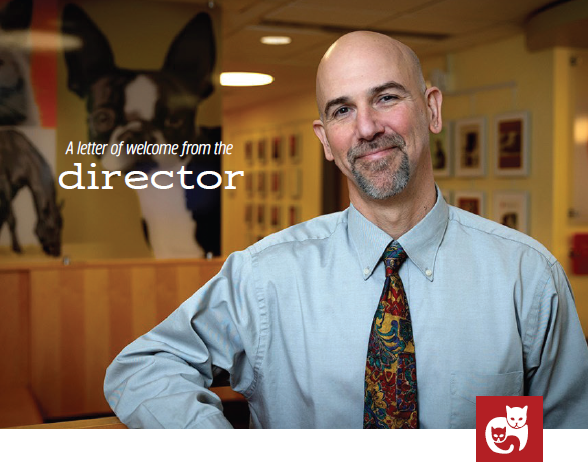Letter from the Director

Greetings from Ithaca, and as we slowly emerge from the COVID-19 pandemic, I hope this note finds you and yours doing well and feeling optimistic.
Speaking of optimism, this past year has been an exciting one here at the Center, and we have many truly inspiring things to celebrate, look forward to, be thankful for, and to work toward.
Of course, we could not do any of these things without the generous support of our donors, and we are humbled and eternally grateful for your partnership in our mission to make the world a better place for all cats.
Research provides the basis for all improvements in feline medicine, and we are proud to support a variety of both clinical and basic scientific Cornell researchers that are currently focused on answering important questions that will impact how we diagnose, treat, and prevent feline diseases in the future. These studies all provide reasons to be optimistic about the future of feline well-being, and you can learn more about the wide range of interesting and impactful research that we support by visiting our website at the QR inside.
Since a primary focus of our operations is the support of such feline-focused research, and since feline nutrition is a very important and sometimes controversial topic, we are particularly excited about the work of Dr. Laura Goodman, assistant professor in the Department of Public and Ecosystem Health here at Cornell University.
Dr. Goodman’s laboratory is currently using cutting-edge molecular biologic techniques to investigate the prevalence of bacterial and parasitic pathogens in commercially available raw cat foods. Such pathogens have the potential to harm both cats and their owners, and while we understand the passion that some cat enthusiasts possess for feeding cats raw foods, preliminary studies suggest that this can be a hazardous practice. Dr. Goodman’s work is the most extensive of its kind with respect to quantifying the health risks of feeding cats commercially available raw cat foods, and the results of this work will provide vital information to the cat-loving community.
We believe that informed cat enthusiasts make the best owners and stewards of feline well-being, and Dr. Goodman’s excellent work is just one example of how we turn donor support into impactful and actionable information for both veterinary professionals and the cat-loving public.
The two other pillars of our operation are outreach and education of both veterinary professionals and the cat-loving public, and we undertake these aspects of our mission very seriously. Whether through our highly visited website, our new multi-tiered membership program and its associated benefits of membership, our renowned Fred Scott Feline Symposium, for which we recently hosted the College’s first-ever hybrid educational event, or our Camuti Consultation Service, we work hard every day to educate and support those who love cats and who take care of them.
You can find out more about our unique outreach programs elsewhere in this streamlined printed annual report and in the expanded online version; and we are thankful to have so many reasons to feel optimistic about our work and, more importantly, about the future of cats throughout the world.
Working together, we can make the world a better place for all of our feline friends, and this, in and of itself, is a reason to feel optimistic. Since cats enrich our lives so much, I think it’s wonderful for both you and I to be able to say that we are working toward returning the favor in so many ways.
Best regards from all of us here at the Center, and wishing you health, happiness, and peace.

Bruce G. Kornreich, D.V.M., Ph.D., DACVIM
Director, Cornell Feline Health Center




